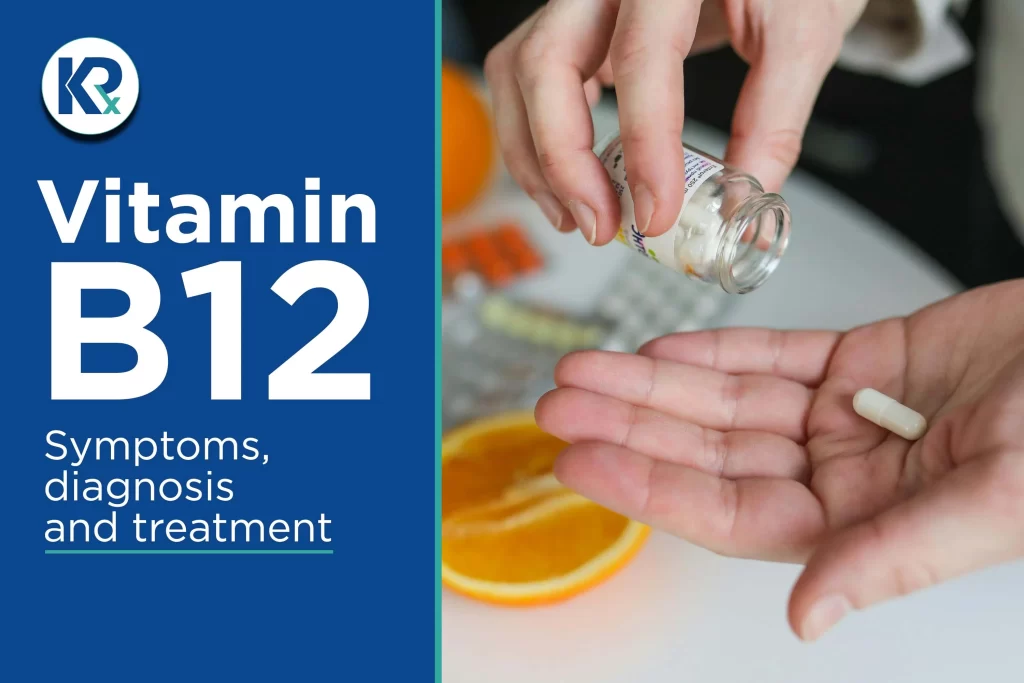
Vitamin B12 deficiency can lead to a range of symptoms and health problems. In this blog, we provide an overview of its symptoms, diagnosis, and treatment.
Symptoms of Vitamin B12 Deficiency:
Vitamin B12 deficiency can affect various parts of the body. For instance, it can cause excessive hair loss at the top of the head and numbness in the feet. It’s important to note that the severity of symptoms may vary from person to person. Here are ten common symptoms of vitamin B12 deficiency:
- Weakness and Fatigue: One of the most prevalent symptoms is persistent fatigue or weakness. Think of it as having high inertia when starting tasks or changing positions, such as getting up from a seated position.
- Anaemia: B12 deficiency can lead to anaemia, resulting in pale skin. The type of anaemia associated with vitamin B12 deficiency is macrocytic anaemia, which differs from anaemia caused by a lack of folic acid by its usual association with neurological symptoms.
- Shortness of Breath and Dizziness: Anaemia reduces the blood’s oxygen-carrying capacity, leading to shortness of breath and dizziness. It may also be associated with halitosis (bad breath).
- Tingling and Numbness: Neurological damage is a prominent effect of vitamin B12 deficiency, often causing numbness in the hands and feet.
- Difficulty Walking: Muscular weakness, especially in posture-maintaining muscles, can lead to balance and coordination problems, as well as difficulty walking. Speech difficulties may also arise due to weakened speech muscles.
- Cognitive Issues: Symptoms may include memory problems, mood changes, difficulty concentrating, negative thoughts, and irritability.
- Heart Palpitations: Anaemia can lead to an increased heart rate, and laxity in the heart valve ligaments can cause palpitations.
- Mouth and Tongue Changes: These may manifest as a sore tongue, mouth ulcers, and a smooth, red tongue.
- Vision Problems: Vision can become blurred or disturbed.
- Indigestion: Vitamin B12 plays a role in maintaining the normal function of the digestive system, which can result in indigestion or poor absorption of nutrients.
Vitamin B12 Deficiency Diagnosis:
Diagnosing vitamin B12 deficiency typically involves a combination of clinical evaluation and laboratory tests, including:
- Blood tests: The most common test measures serum B12 levels. Low levels may indicate deficiency, although this alone isn’t always conclusive. It’s crucial to use a fresh blood sample for accurate results because vitamin B12 levels decrease as the sample ages.
- Complete Blood Count (CBC): This test checks for anaemia and its type. B12 deficiency is associated with macrocytic anaemia, characterised by a high mean corpuscular volume (MCV). Other blood-related issues, such as enlarged white blood cells, a low red blood cell count, and large platelets (high MPV), may also be observed.
- Methylmalonic Acid (MMA) Test: Elevated MMA levels suggest B12 deficiency.
- Homocysteine Test: Elevated homocysteine levels can also indicate deficiency.
- Schilling Test: Although rarely used nowadays, it helps determine if absorption issues are the cause, often due to intrinsic factor deficiency.
Causes of Vitamin B12 Deficiency:
Several factors can lead to vitamin B12 deficiency:
- Dietary Insufficiency: Inadequate intake of B12-rich foods, especially in vegans and vegetarians.
- Gastrointestinal Disorders: Conditions like pernicious anaemia, celiac disease, Crohn’s disease, and atrophic gastritis can hinder B12 absorption.
- Medications: Certain medications, such as proton pump inhibitors, metformin, and broad-spectrum antibiotics, can interfere with B12 absorption. Broad-spectrum antibiotics kill the beneficial gut bacteria responsible for synthesising vitamin B12.
- Surgery: Some weight loss surgeries can reduce the body’s ability to absorb Vitamin B12.
- Ageing: With age, the ability to absorb B12 from food may decrease.
Vitamin B12 Deficiency Treatment:
Treatment for vitamin B12 deficiency typically involves addressing the underlying cause and supplementing with B12. However, it’s important to note that treating vitamin B12 deficiency alone may not be sufficient, as it is often associated with other micronutrient deficiencies. Therefore, an improved diet containing adequate protein and other micronutrients, along with multivitamin-multimineral supplements if necessary, should be considered.
Treatment options for vitamin B12 supplementation include:
- Dietary Changes: Increase consumption of B12-rich foods such as milk, dairy products, eggs, meat, and fish.
- Oral Supplements: Most individuals with mild deficiencies can take oral B12 supplements, typically in the form of cyanocobalamin or methylcobalamin.
- Injections: Severe deficiencies or absorption issues may require B12 injections.
- Vitamin B12 Nasal Spray: This is a popular method of supplementation, particularly for those averse to injections.
- Lifestyle Modifications: Address underlying causes, including gastrointestinal disorders and habits like narcotics and alcohol consumption.
- Regular Monitoring: Follow-up blood tests are essential to ensure B12 levels return to normal.
If you suspect you have a vitamin B12 deficiency or experience any of the mentioned symptoms, it is essential to consult a healthcare professional. Untreated B12 deficiency can lead to severe health complications, including neurological damage and anaemia.
